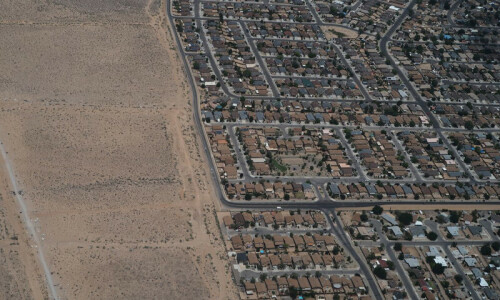SINCE November 2021, the small Muslim community in Albuquerque, New Mexico, had been scared. By early August 2022, four Muslim men from the community had been killed in mysterious circumstances, and nobody had any idea of why they had been murdered. Many suggested that the reason was Islamophobia; so much of Trump’s ‘make America great again’ rhetoric relies on hatred of Muslims. Maybe someone was targeting people from the community.
The first victim was an Afghan man named Mohammad Ahmadi. The 62-year-old was killed outside a market he ran with his brother on Nov 7, 2021. This was the first of the four killings. Then on July 26 this year, New Mexico police received a notification from ShotSpotter, which tracks gunshots heard. It was past 10pm when they arrived at the scene to find a man who had been shot and was lying next to a vehicle. The assailant had apparently hidden in the bushes behind the car, waiting, and had shot the man as he parked and exited his car on his way home.
The second victim was identified as Aftab Hussein, a Pakistani man. Police identified the shell casings from both crime scenes to have been fired from the same gun. Then a third murder took place. On Aug 1, 2022, police were called when someone heard a number of gunshots on a residential street in Albuquerque. Others also began to call the police, who had heard their own notification of three shots fired from ShotSpotter. The police responded to the scene in just a few minutes and arrived to find a Pakistani man named Afzaal Hussain lying dead on the street. An urban planner who was only 27 years, Afzaal Hussain and his family were used to taking walks in the evenings. He never returned from this one.
Even though there had been three murders of Muslim men, there was no known motivation for the crime. The Muslim community in Albuquerque was terrified. Some people were so scared that a serial killer was on the loose that they stopped leaving their homes, prompting city officials to offer to deliver food to them. By the time of the third murder, the case had become bigger news than in the early days. By this time, investigators felt that it was quite likely that all three of the killings were somehow connected. Despite the help of community members, no one could quite figure out what that connection was.
Many members of the Muslim community in Albuquerque are terrified of going outside their homes.
The funerals for Aftab Hussein and Afzaal Hussain were held at the Islamic Centre of Albuquerque. At 10:38am, after participating in the funeral for the two slain men, Naeem Hussain, a Pakistani man, was in the Highland shopping district in Albuquerque when he was gunned down. He was only 25 years old. The police at this point finally began to see the similarities between the murders that took place on Nov 7, July 27, Aug 1 and now Aug 3.
With four members of the community dead, many began to hypothesise that the killings may have been motivated by sectarian animus.
Sadly speaking, some elements in American states often discriminate against Shia communities by speaking of them in derogatory terms and even harassing and bullying them when they show up for prayers at mosques. The community in Albuquerque did not have a particular record of anti-Shia sentiment and so it seemed unlikely that the person was from their own community. At the same time, it is also true that most micro-aggressions felt by Shia Muslims in the United States do not get recorded. Furthermore, three of the murders had occurred during Muharram.
It took until a few days ago for the authorities to round up a suspect for the four murders. He was a 51-year-old Afghan man who had arrived in the city as a refugee in 2012.
Read: 'What sectarian killings?'
The suspect, who has six children, had been involved in domestic violence incidents for several years. In one, his wife called the police because he dragged her out of the car by her hair and was beating her. In another incident, his son called the police because his father had hit his head with a metal spoon, causing wounds.
The suspect reportedly had problems with the victims. The first victim, for instance, was the brother-in-law of a woman who had so enraged the suspect that he had allegedly slashed her tyres. He is also said to have told the police he liked AK-47 type weapons.
It is still being debated whether it was sectarian hatred or simply interpersonal conflicts that were the real reason behind why a man like him had targeted four men in his community. While community leaders are helping the police, there is still fear in the community, most likely because it is hard to think of people you know as people who may murder you.
In the larger Muslim American community, the sad incident reflects on how the schism between Shia and Sunni communities in Pakistan and Afghanistan are exported to foreign countries, where people live in diaspora. Just like the efforts to create dialogue and a spirit of tolerance are ignored at home, so too are they ignored abroad. This is especially true if one community is in a large majority.
What took place in New Mexico is an extreme incident in the United States, where most murder culprits are caught, but it is not something out of the ordinary in Pakistan or Afghanistan, where sectarian murders in the Muslim community are not unknown. That may well be the real problem: a mix of male rage and sectarian hubris, neither of which can be solved by the New Mexico police.
The writer is an attorney teaching constitutional law and political philosophy.
Published in Dawn, August 17th, 2022














































